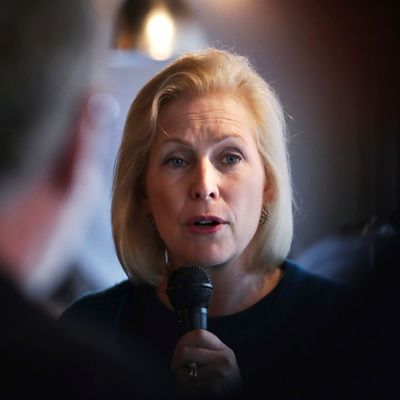
In a Medium post, Senator Kirsten Gillibrand outlined a new, family-centered economic policy and pledged to enact it within the first 100 days of her presidency. The five-point plan is meant to address rising child-care costs, the nation’s OB/GYN shortage, and a lack of paid leave — all issues that can prevent households from having as many children as they’d like or from having children at all. It follows the candidate’s recent major proposal on expanding abortion rights and frames gender and racial justice as economic issues.
Citing a need to reduce the country’s high death rates from pregnancy complications, Gillibrand said she’ll ensure that “states and hospitals are equipped to prevent and respond to pregnancy complications” and pledged to create a plan to address a shortage of OB/GYNs in rural communities. The plan would also prohibit adoption agencies from discriminating against potential parents on the basis of religion, require insurance companies to cover IVF treatments, and provide “baby bundles” to all new parents. “These bundles will be filled with the most important items for a child’s first month at home, like diapers, swaddle blankets, and onesies, all in a box with a small mattress that can be repurposed as a nursery bed,” she wrote.
The plan would also introduce “a national paid family and medical leave insurance program,” expand the Children’s Health Insurance Program to cover every child at birth, implement universal pre-K, and grow the Child and Dependent Care Tax Credit, which is intended to offset care costs for working parents and guardians. As the Tax Policy Center explained in 2018, approximately 11.8 percent of households with children currently receive the credit. It is available only to parents and guardians who are working or in school; two-parent households, for example, are not eligible if one parent stays home. Gillibrand’s Medium post doesn’t specify how exactly she plans to expand the credit to cover more care. It does, however, explain how she intends to pay for everything: She supports a tax on financial transactions, which would, she said, raise $777 billion in revenue over ten years.
It’s a detailed vision, and Gillibrand is careful to single out racial disparities in maternal deaths and access to family leave as specific matters of pressing concern. In some respects, it also resembles policy positions — namely, baby bundles or boxes and the expansion of health-care access — put forward by the People’s Policy Project, an independent left-wing think tank.
Gillibrand has struggled to keep up with other candidates in polls, and her path to the nomination is further complicated by the fact that a handful of early front-runners, including senators Elizabeth Warren, Bernie Sanders, and Kamala Harris, are competing with her for the same social-democratic lane. But the primary is still in its infancy, and there’s time for the senator to distinguish herself to Democratic voters. Republicans might even help make her case: As conservative lawmakers ramp up attacks on reproductive rights and stymie attempts to expand Medicaid coverage to vulnerable households, Gillibrand’s emphasis on women’s rights and family life as issues deserving preeminent attention may play well with outraged voters.






























